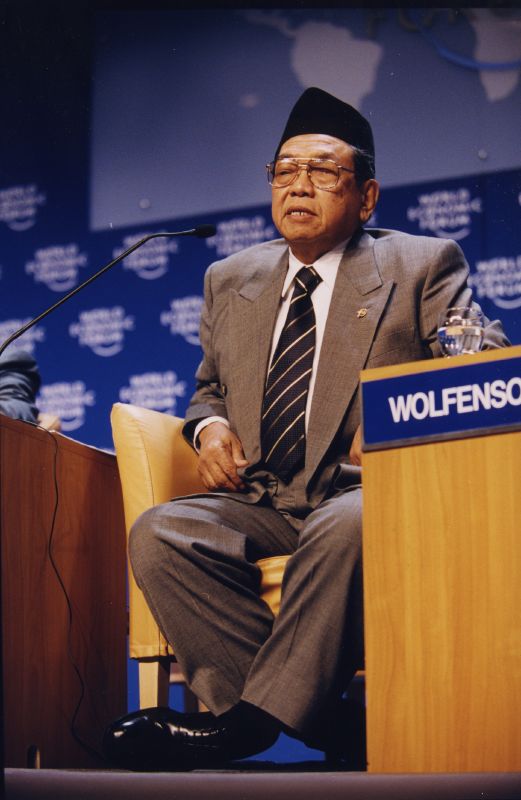Gus Dur
Abdurrahman Wahid (/ˌɑːbdʊəˈrɑːxmɑːn wɑːˈhiːd/ ⓘ AHB-doo-RAHKH-mahn wah-HEED; born Abdurrahman ad-Dakhil;[1][2] 7 September 1940 – 30 December 2009), though more colloquially known as Gus Dur (ⓘ), was an Indonesian politician and Islamic religious leader who served as the 4th president of Indonesia, from his election in 1999 until his removal from power in 2001. A long time leader within the Nahdlatul Ulama organization, he was the founder of the National Awakening Party (PKB). He was the son of Minister of Religious Affairs Wahid Hasyim, and the grandson of Nahdatul Ulama founder Hasyim Asy'ari. He had a visual impairment caused by glaucoma; he was blind in the left eye and partially blind in his right eye. He was the first and as of 2023 the only president of Indonesia to have had physical disabilities.
Wahid was instrumental in lifting the ban on Imlek. Until 1998, the spiritual practice to celebrate the Chinese New Year by Chinese families was restricted specifically only inside of the Chinese house. This restriction is made by the New Order government through a Presidential Instruction No. 14 of 1967 signed by President Suharto. On 17 January 2000, the President Abdurrahman Wahid issued Presidential Decree No. 6 of 2000 to annul the previous instruction.[3] He was also the one who established Confucianism as the sixth official religion in Indonesia in 2000 and the one who protected minority rights in Indonesia. As a result, he was given the title "Father of Pluralism".[4]His popular nickname 'Gus Dur' is derived from Gus, a common honorific for a son of kyai, and from the short-form of bagus ('handsome lad' in Javanese[5]); and Dur, short-form of his name, Abdurrahman.
Abdurrahman ad-Dakhil was born on the fourth day of the eighth month of the Islamic calendar in 1940 in Jombang, East Java to Abdul Wahid Hasyim and Siti Sholehah. This led to a belief that he was born on 4 August; instead, using the Islamic calendar to mark his birth date meant that he was actually born on 4 Sha'aban, equivalent to 7 September 1940.
He was named after Abd ar-Rahman I of the Umayyad Caliphate who brought Islam to Spain and was thus nicknamed "ad-Dakhil" ("the conqueror"). His name is stylized in the traditional Arabic naming system as "Abdurrahman, son of Wahid". Abdurrahman is of Chinese, Arab and Javanese ancestry.[6][7] From his paternal line, he is descended from a well-known Moslem missionary from China known as Syekh Abdul Qadir Tan Kiem Han who was a disciple of Sunan Ngampel-Denta (Raden Rahmat Bong Swie Hoo) – one of the Nine Wali (Holy Islamic Saints) who became one of the first Islamic Kings on Java who islamicized Java in the 15-16th centuries.



Comments
Post a Comment